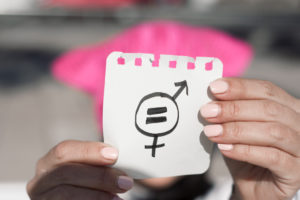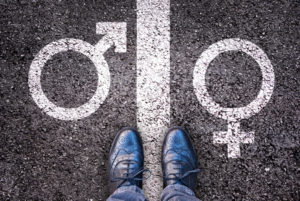
International Women’s Day is connected to over a century of feminist protest, action, and activism. From women’s right to vote to anti-war, and anti-Imperialist action, women have mobilized in different contexts with calls for inclusion and representation.
Let’s make sure women and girls can shape the policies, services and infrastructure that impact all our lives. And let’s support women and girls who are breaking down barriers to create a better world for everyone.
UN Secretary-General, António Guterres
In 1975, March 8th was designated as International Women’s Day by the United Nations (UN). Since that time, the recognition of gender as a social construct comes from the work and analysis from feminist and queer activists. Gender influences everyone’s social, cultural, economic, and political position, and inequities result.
While this important feminist work might cause one to think that feminism is unified and monolithic, it is anything but. Feminist writer and scholar Dr. Roxanne Gay reminds us that feminism is plural. Women live, work, and play in different contexts, and as a result, there are myriad of feminisms to be articulated. Shouldn’t we be celebrating this plurality? And challenging systems of power to restore balance?
The theme for International Women’s Day 2019 is #balanceforbetter.
Roxanne Gay might call us Bad Feminists. We are inspired by Sara Ahmed to take up the work of Feminist Killjoys. We, therefore, argue that balance isn’t enough. We must commit to righting the wrongs of systemic gendered, classed and racist inequities.

The ‘we’ in this instance is a collective ‘we’. One made up of folks who may benefit from the systems we are asking them to disrupt. This is uncomfortable and exhausting work. Be prepared and be willing to be the Killjoy. And be the ally, because this is a ‘we’ that demands allyship.
Let’s dispense with the idea of a global sisterhood, which trivializes particular women in particular contexts. There is no global sisterhood because there is not one problem and not one solution. But, there are possibilities for transnational allyship, and the work to be done here is immense and heavy. It is the kind of work wherein one does not strive for balance. Balance is a job undone. As such, we assert gender balance in and of itself is not a goal worthy of pursuing. Instead, we strive for systemic transformation.
As an example, the recent testimony from a variety of politicians and public servants about the Canadian government’s investigation into fraud and corruption by Canadian company SNC-Lavalin demonstrates that a gender-balanced Canadian cabinet does not disrupt unjust and gendered and racist systems. Instead, superficial efforts that deliver gender-balance sometimes serve to reinforce dichotomous gender roles while maintaining power within imperialist white supremacist capitalist patriarchy.
We must disrupt these presumed loci of change. Let’s take the lead from Black and Indigenous feminist scholars, who have been contributing important and nuanced understandings of the embedded – and often unacknowledged – systems of oppression. In Canada, for example, the Indian Act has deprived Indigenous and Two Spirit communities full participation as sovereign peoples. Indigenous feminist and Two Spirit activists and scholars are reinserting their pivotal roles in all areas of Indigenous life.

Let’s take the lead from our young activists and emerging leaders, who are standing up to systems of oppression; the systems of patriarchy, misogyny, and racism, on the international, national, and local stages. Let’s listen more closely to the voices of the next generation of leaders. Voices that come from the #MeToo and March for Our Lives movements. Let’s take the lead from our local community members, where our neighbours are connecting and supporting newcomers and challenging government policy on what it means to be a refugee.
Lest we continue to walk precariously along the tightrope of gender balance.
Comments